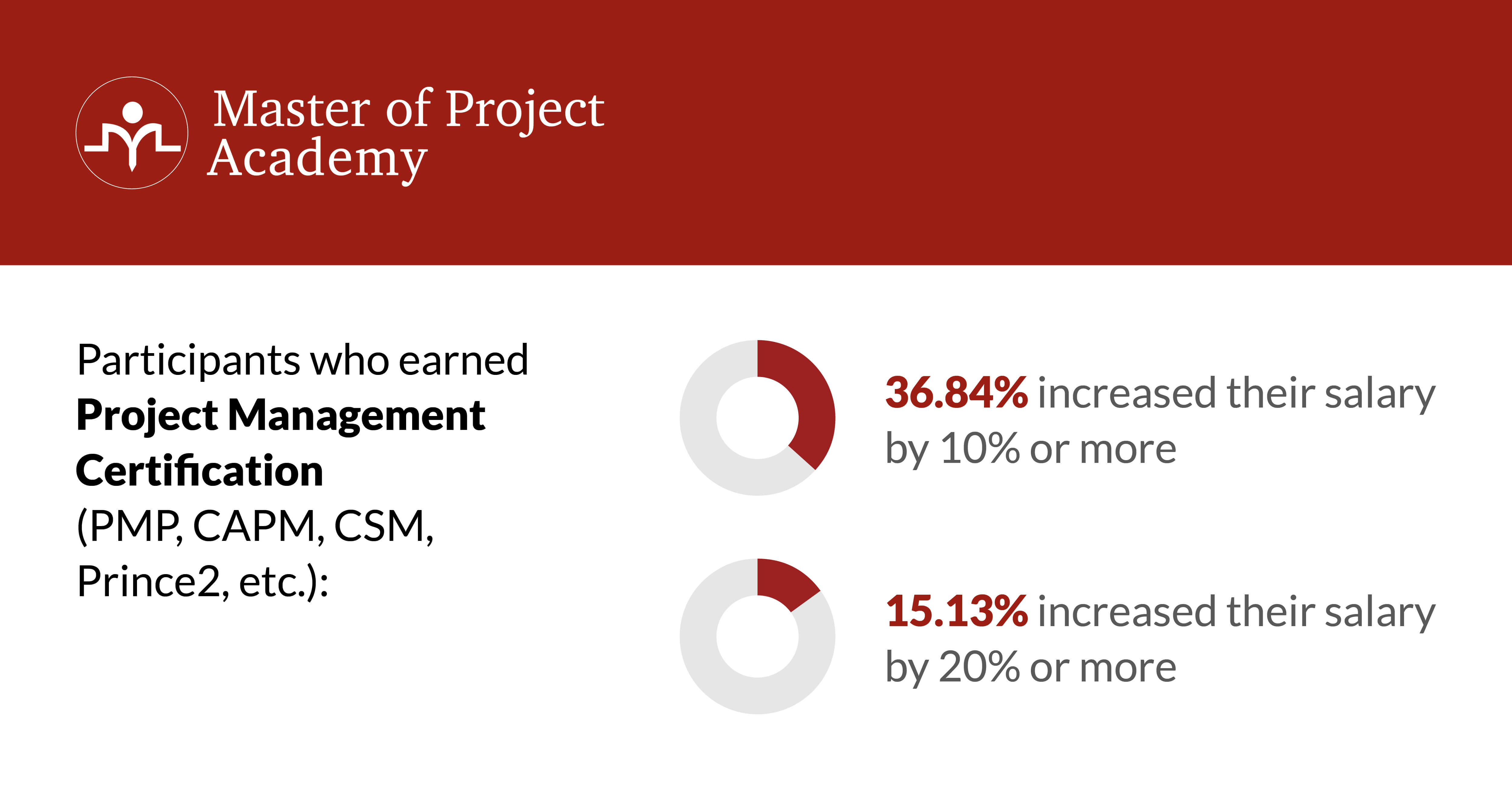Whether you are totally new to the project management profession, or a seasoned veteran of the craft, you know how challenging this career choice can be. It is an occupation unlike any other and requires a special cocktail of soft and technical skills. To excel in the profession, you need a strategic advantage — the project management professional (PMP) certification is the tool that can give you that advantage. So in this article, we are going to talk about PMP designation.
What is the PMP Designation?
The PMP certification, the foremost professional credential for project managers. Project Management Institute provides this certification. It is globally recognized, with over one million professionals possessing the credential worldwide. In addition to being instantly recognized as someone who is technically adept in the craft of project management, the PMP designation provides several other residual PMP benefits that can serve you well during the course of your career.

-
PMP designation gives you valued skillsets across various industries and technical fields
No matter whether you work in information technology, business, engineering, government, academia, etc., the PMP certification provides you with valuable knowledge that can be utilized across practically any professional discipline. Project management rigor is in demand no matter what industry you choose to engage in, and you can leverage the skills you learned in just about any professional capacity.
Attend our 100% Online & Self-Paced One-Hour Free PMP Training.
-
PMP designation enhances leadership development
Project managers are, by their very nature, team builders, and motivators. An effective project manager’s role is to organize and lead productive teams to achieve maximum results. The skills you learn via PMP designation will provide you with the knowledge you need to lead your teams through the many peaks and valleys of successful project execution. Furthermore, the knowledge you gained through certification gives you plenty of tools and techniques for the effective construction and management of high-performing teams.
-
PMP designation provides instant recognition
First, you immediately gain the benefit of belonging to a community of highly respected professionals who have demonstrated a comprehensive knowledge of a complex discipline. Attainment of the PMP designation also immediately signifies your commitment to the project management profession and indicates your desire to grow in the field. PMP’s are respected for their technical acumen and dedication to the craft. By passing the PMP exam you have exhibited a commitment to the understanding and practice of an extensive body of knowledge.

-
PMP designation provides enhanced networking
With the PMP designation, you can leverage the power of a network of over one million credential-holders. Moreover, you can utilize opportunities to learn and grow from like-minded professionals through knowledge sharing, group interactions, and educational opportunities. Finally, you can locate new and different professional opportunities that you might not otherwise know about.
-
PMP designation gives you competitive Advantage
The PMP designation provides you an immediate advantage in an increasingly competitive labor market. Many companies now list PMP designation as a pre-requisite for consideration for a role within their organizations, or, at least the expectation that a new hire will pursue the certification within a certain length of time. Many companies view project managers with PMP credential as favorable to run their most demanding projects.
-
PMP designation provides continuous learning mindset
One of the key mandates of the PMP credential is continuous learning, i.e. always growing in the profession. In order to retain the certification, a PMP must demonstrate (and document, in the form of PDU’s – more on this later) efforts to grow and mature in the project management profession. These efforts may include (but are not necessarily limited to) on the job practice, instruction of others, participation in functions that promote project management, and academic pursuits (more education, etc.)
-
PMP designation gives you an enhanced toolbox of hard skills
The basis of the PMP certification is a demonstrated knowledge of the PMBOK – the Project Management Body of Knowledge. Successful attainment of the PMP means that you have demonstrated an effective knowledge of the tools, practices, and protocols documented in the PMBOK which, when utilized, greatly enhances your chances of successful project execution as a project manager.
One of the Main PMP Designation Benefits: PMP Salary
One of the more tangible benefits of the PMP designation is the enhanced earning power that it can provide to you as a professional project manager. On average, a PMP can expect to earn approximately 20% more in compensation than their non-certified peers. Of course, there are many complex factors that determine your level of compensation, but the PMP certification certainly positions you very well for increasing your salary potential. In fact, project managers are one of the key occupations desired in technology firms today. It is also worth mentioning that the project management profession and PMP designation have relevance across practically every industry, which means that competent PM’s are highly coveted. This translates to higher demand, and higher salaries, across the board.

How can I earn PMP Designation?
So, if by now, the presentation of facts has led you to the conclusion that you want to earn the PMP designation, then the next logical question becomes – how?
PMI requires that you submit to an application process in order to sit for the PMP exam. As part of that PMP application process, you must meet certain pre-requisites, defined in two educational/professional experience scenarios.
PMP Education Requirements
Scenario A: You have a secondary degree (high school diploma/associate’s degree or global equivalent).
Scenario B: You have a four-year degree (bachelor’s degree or global equivalent).
In addition to the above educational requirements, you must also complete a formal education course in project management consisting of at least thirty-five contact hours of instruction.
PMP Experience Requirements for PMP Designation
Scenario A: You have a minimum of five years (60 months) of unique non-overlapping professional project management experience during which at least 7,500 hours were spent leading and directing the project.
Scenario B: You have a minimum of three years (36 months) unique non-overlapping professional project management experience during which at least 4,500 hours were spent leading and directing the project.
Upon confirming your full compliance with one of the two above scenarios (including the thirty-five hours of formal education) you then begin the formal application process with PMI. This consists of documenting your eligibility to sit for the exam. Once they approve your application, you will be eligible to sit for the PMP exam.
For more detailed information on the application process, refer to our PMP application article.
What to expect on the PMP Exam
As stated previously, the PMP exam is based upon knowledge found in the Project Management Body of Knowledge (PMBOK).
Knowledge in the PMBOK is stratified in two different ways; first by the five process groups then secondly by the ten knowledge areas within the project management methodology. In all, forty-nine total processes comprise PMI’s project methodology.
The five process groups are:
- Initiating
- Planning
- Executing
- Monitoring and controlling
- Closing
The ten knowledge areas are:
- Integration management – consisting of seven processes
- Scope management – consisting of six processes
- Schedule management -consisting of six processes
- Cost management -consisting of four processes
- Quality management -consisting of three processes
- Resource management – consisting of six processes
- Communications management – consisting of three processes
- Procurement management – consisting of three processes
- Risk Management – consisting of seven processes
- Stakeholder Management – consisting of four processes
The exam consists of two hundred multiple-choice questions (of which only one hundred seventy-five are actually scored) and typically the question content adheres to the following distribution:
- People 42%
- Processes 50%
- Business Environment 8%
Though the generally accepted metric for an exam pass is sixty-one percent, the more correct assumption is that the pass rate can vary from candidate to candidate.
How can I retain PMP Designation?
As mentioned earlier, one of the key (and I think underrated) benefits of the PMP certification is the encouragement (yea, mandate) of PMI to engage in continuous learning and growth in the project management profession. In many respects, this is what sets the PMP designation apart from other professional credentials that you may attain. Because PMI requires you to document your professional growth (in three-year cycles) in order to retain your professional certification. This PMP certification renewal is done through the earning of professional development units (PDU’s) which are documented with PMI and approved. You must earn a total of sixty PDU’s during the three-year period. Failure to do so will result in suspension, and ultimate revocation of the credential if you don’t meet the PDU requirement.
You can earn PDU’s in two realms – through formal education and through advocating the profession, called giving back.
Let’s take a look at the tenets of each.
-
You can attain Education PDU’s (minimum of thirty-five) in the following manners:
- Formal training/course work – Face-to-face classes, e-learning
- Organization meetings – attendance at PMI-recognized events advocating project management concepts
- Online learning – self-paced PDU courses, digital media
- Informal learning – engaging in project management discussions, participating in lunch& learn exercises, etc.
- Self-directed reading on project management topics
-
You can attain Giving Back PDU’s (maximum of twenty-five) in the following manners:
- Practice the profession – operate as a practitioner of project management
- Create some content on project management — digital media, blogs, webinars, etc.
- Present at a PMI chapter or some sort of conference
- Knowledge share – mentor, teach or otherwise share your expertise with others
- Identify opportunities to volunteer your project management expertise in your community
The Education category has three subcategories, and you must earn a minimum of eight PDU’s in each:
- Technical
- Leadership
- Strategy & Business
The Giving Back category has one variation called “Work as a Practitioner” which you can only earn up to eight PDU’s maximum.
Author: Phil Hamlett – PM Consultant | Adjunct Instructor



